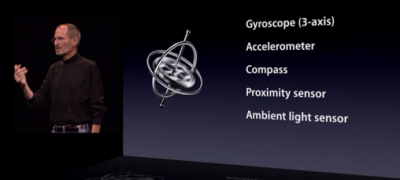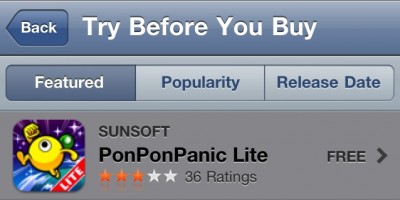News tagged ‘test’
Saurik released a PDF patch for older and already jailbroken iOS devices
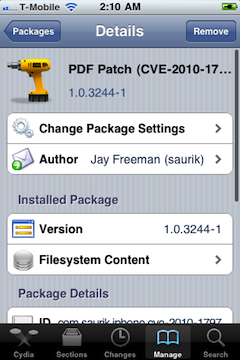
As you may know, few days ago Apple had released a new version of iOS for all its mobile devices except first-generation iPhone and iPod touch, so owners of the latter are still not protected from a security flaw that allows hackers to obtain a remote control of their handsets. In fact, the latest compatible version for them is currently iOS 3.1.3.
But Saurik (who is known as a developer of Cydia) recently announced on the Dev-Team blog that he released a PDF patch that is compatible with any iOS version down to 2.x. It can be found in Cydia if you'll search for "PDF Patch". After installing it you can check if the patch is working properly with visiting jailbreakme.com page. After sliding the box to jailbreak you should only see the star background (and not a dialog box), which means you are no longer vulnerable.
Read the rest of this entry »
 Leave a comment, read comments [9]
Leave a comment, read comments [9]
Regent Street and Comfortable Environment for Apple Customers
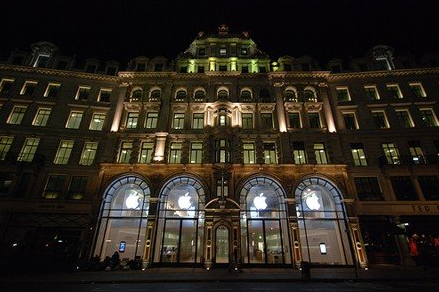
In the world, the Apple's Regent Street store is still the busiest selling point, according to senior vice
president of Apple's retail sales Ron Johnson. He has highly appreciated Regent Street considering that undertaken
risk has been justified. Now, in the Regent Street store has one of the best traffic performances in the world.
The Apple network has had a significant impact on the retail sector. Many other stores around the world seek to
repeat their success.
A Gyroscope Will Be Added To The Next-Gen iPad
According to UBM TechInsights, Apple had been testing an InvenSense gyroscope in its iPad prototypes, but final version of the next-gen iPad will use a component from STMicroelectronics, which is also used in the iPhone 4. The company's product manager Steve Bitton wonders why there is no gyroscope in the current iPad.
“It seemed strange at the time that a product like the iPad would have been designed to not include a gyroscope but an iPhone 4 that was being designed at around the same time would”.
Moreover, Bitton disassembled an iPad and found an empty space where gyroscope exactly fits. And if InvenSense unit requires 24 pads, STMicro L3G4200D unit needs only 16 pads and is already used in the iPhone 4, so it obviously will be easier for Apple to use a component, which is also already supported by an iOS4.
"Apple probably chose to wait until the next iteration of the iPad to introduce gyroscope capabilities [and plans] to use [the] ST Micro’s L3G4200D to reduce the amount of [software] development required”.
Concerns about the First Generation iPod Nano Battery in Japan
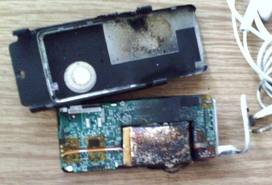
According to the Reuters news agency, one of the Japanese authorities demanded from Apple to provide customers with the information about obtaining spare batteries for the first generation IPod Nano with respect to the fire hazard from the superheated batteries.
The authorities requested Apple to issue on the Internet an easy-to-understand statement to explain how the users of the device involved in four cases of minor burns in Japan will be able to receive spare batteries and appropriate consultations.
The Japanese authorities began to put pressure on Apple on this issue last week but the company referred to the fact that the matter had been transferred to the supplier of batteries. The company said that safety would be considered as their top priority.
Video comparison: Windows 7 Tablet vs Apple iPad
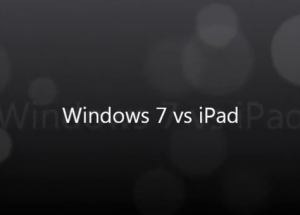
Both Windows 7 Tablet and Apple iPad look great. Here is a video with each of them being tested in email, video, browsing, mapping, etc.
CNet Video: iPhone 4 bumper test
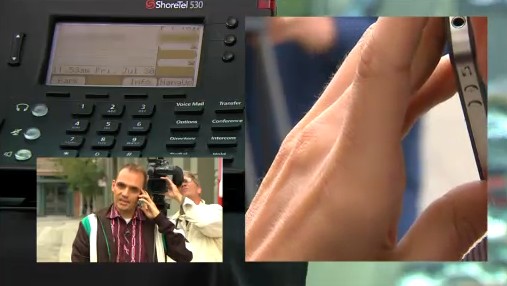
Do Apple's bumper cases fix the iPhone 4 antenna issue? CNet tested it. Watch the video:
App Store Launches "Try Before You Buy" Section
New section in App Store called "Try Before You Buy" allows users to test drive selected list of apps before purchasing it.
At the current moment section contains freemium, "lite" and ad-supported apps that have both free and paid versions. If the app doesn't have free version, it will not appear in the section.
Section "Try Before You Buy" can be found under the "Free on the App Store" heading. Currently there are 98 apps, including such games as Labyrinth 2, Metal Gear Solid Touch, Grand Theft Auto: Chinatown and free versions of apps like AccuTerra and Moodagent.
New Survey Reveals That iPhone 3GS Drops Calls More Often Than iPhone 4
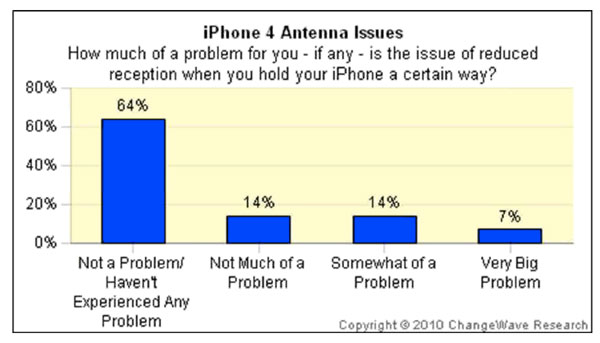
Today ChangeWave Research revealed the results of its survey on iPhone 4. 213 new handset owners were questioned in a few weeks after the launch of the latest Apple's smartphone, between July 19 and 28. Here is a list of facts that were revealed:
- In June 6.3% of iPhone 3GS owners experienced dropped calls, in July only 5.2% of those who use iPhone 4 had dropped a call at least once. ChangeWave Research's vice president Paul Carton says that means that iPhone 4 is quiet better at making calls:
"Despite all of the issues surrounding the antenna, in actuality iPhone 4 owners reported experiencing fewer dropped calls on the average than iPhone 3GS owners".
FaceTime over 3G consumes 3Mbyte/min
Guys from 9to5mac decided to count how much data FaceTime uses over 3G. They made a 5 minute test call, and concluded that FaceTime takes 3 Mb every minute. Not much at all!
Here are the screenshots before and after the call.
iPhone 4 FaceTime video call over 3G is now possible
FaceTime feature gives users the possibility to make voice calls. Apple restricted this feature to Wi-Fi only. Today it became possible to use it over 3G!
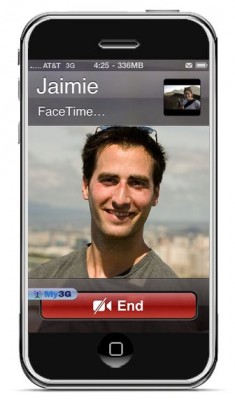
Setup Instructions:
- Jailbreak your iPhone 4 via .
- Download and upgrade to the latest Cydia package.
- Open Cydia, Go to Manage then Sources.
- Click Sources, Edit then add: http://apt.modmyi.com
- Search for "My3G" -- download, and install it. It costs $2.79. My3G makes Apps believe that they are on WiFi instead of 3G.
- Go through the Rock setup process with a username and password. Open My3G and leave all settings on the default.
- FaceTime should now work over 3G! -- Make sure to "Forget" the WiFi network you are on (via iOS settings) if you want to test it.
We haven't seen any difference between the 3G FaceTime call and a WiFi FaceTime call. The quality is very good.
Here's a video demo:
JailbreakMe issue with FaceTime and MMS is fixed
Many users reported that the first version of JailbreakMe broke the FaceTime and MMS features. The DevTeam fixed the bug.
New JailbreakMe users should simply proceed normally. The new version will not remove FaceTime or MMS from the iPhone.
Users who already installed JailbreakMe can get an easy fix. They should simply run Cydia and upgrade to the latest software.
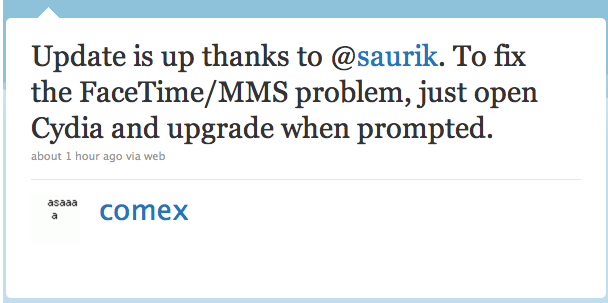
Australian Daily Telegraph: There Is No Antenna Issue In iPhone 4
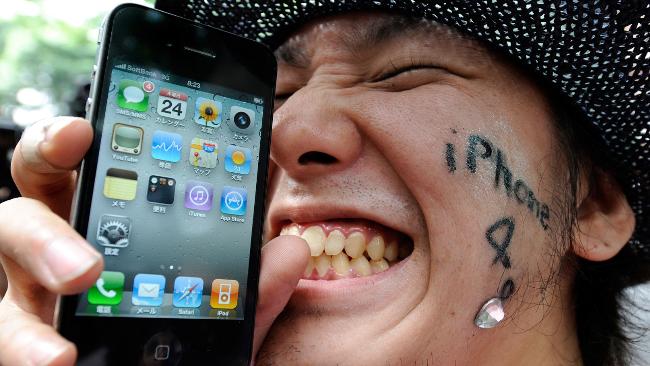
Recently tech journalist Stephen Fenech wrote an interesting iPhone 4 review for Australian Daily Telegraph. Besides saying that iPhone 4 is "a massive jump" in the smartphone industry, Fenech also tried to reproduce the antenna issue. To make sure his results are correct he used his phone on 6 different Australian carriers - Optus, Telstra, Vodafone and 3 other networks in different parts of Sydney. Here is his conclusion:
"I tried the 'death grip' on the bottom left while making test calls in areas I knew to have weaker reception and the times I did manage to reduce the signal bars... my calls were still not affected. The worst thing that happened was a web page I was loading timed out but after refreshing it came up fine. I even managed to watch a YouTube video over 3G while in the 'death grip.'"
Fenech also added that the "death grip" is unnatural and iPhone 4 call quality was significantly improved in comparison to iPhone 3GS.
 Leave a comment, read comments [1]
Leave a comment, read comments [1]
Apple opens Covent Garden retail store
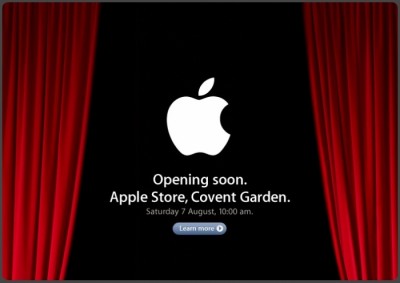
The latest news from Apple - they plan to open a new retail store in (London) on Aug 7th. Nice location, isn't it?
Testing performance of all iPhones together: iPhone 2G, iPhone 3G, iPhone 3GS and iPhone 4
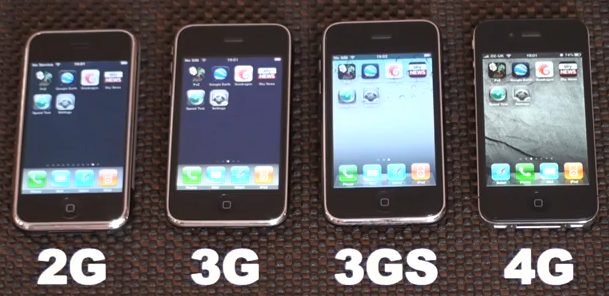
Here is an interesting video demonstrating an iPhone speed test across all four generations of the smartphone (iPhone 2G, iPhone 3G, iPhone 3GS and iPhone 4).
It’s fantastic to see how far the speed of the iPhone has advanced. As you’d expect, the iPhone 4 is obviously the fastest, closely followed by the iPhone 3GS. Interestingly, the difference between the 3GS and 3G is pretty big, as is the difference between the iPhone 3G and the first-gen handset.
Watch the video:
iOS4 vs. WP7 in Browser Speed Test
This week developers started receiving Microsoft’s test units, which will allow them to test the performance of their apps for WP7 instead of using an emulator. The test smartphones are produced by Samsung and LG and have a Technical Preview version of Windows Phone 7, and guys at NewsGeek decided to compare its browser speed with iPhone 3GS' that runs on iOS 4.
Since the difference in speed is so huge it is noted that both of the phones used 3G network (not Wi-Fi) and iPhone 3GS is a completely finished product, while Samsung's test unit is a prototype with an unfinished OS that is still in development.
Newsgeek also found Internet Explorer in the Windows Phone 7 to be "surprisingly competent and quick" though it was mostly built off of IE7's desktop version.
